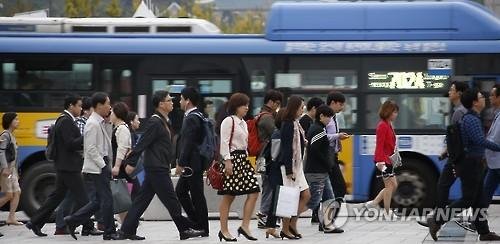South Koreans work the second-longest hours among OECD countries, but with relatively low labor productivity, recent data showed.
Statistics compiled by the Paris-based club of advanced economies show that the average South Korean -- including salaried employees, self-employed and part-timers -- worked 2,124 hours in 2014, up 45 hours from the previous year.
This marks 1.2 times, or 354 hours, more than the average for the 34 Organization of Economic Cooperation and Development member countries, which stands at 1,770 hours per year.

Mexico was the only country ahead of Korea with 2,228 hours. South Korea was the most overworked country in the OECD bloc until Mexico knocked it off the top spot in 2008.
Germans worked 1,371 hours, the least among the OECD, meaning Koreans work four months longer than Germans per year.
Western European and Nordic countries logged less than 1,500 working hours per year, with the Netherlands recording 1,425 hours, Norway 1,427 hours, Denmark 1,436 hours and France 1,473 hours.
Japan (1,729 hours), the United States (1,789 hours), Italy (1,734 hours) and the United Kingdom (1,677) hovered around the OECD average, according to the data.
South Korea’s working hours had seen a steady decrease from 2,512 hours in 2000 to 2,090 hours in 2011, but the figures have fluctuated since then.
The growing number of self-employed workers and the longer hours they put in amid the faltering economy might be linked to last year’s increase for Korea, an expert said.
“The data seems to explain that the self-employed kept their stores open longer as their businesses did not do well,” said Ahn Ju-yeop, a senior researcher from the state-run Korea Labor Institute.
The number of self-employed rose from 5.38 million in 2013 to 5.83 million as of this August in the country with a population of 50 million.
“There are also still many salaried workers at manufacturing companies working for more than 60 hours per week and many who do not take their paid vacations,” said Ahn.
But the long working hours do not necessarily result in higher labor productivity, the level of output for every hour of work, another expert said.
“
South Korea’s employment structure requires workers to work long hours despite low productivity, as it is more cost-effective for businesses,” Kim Jong-jin, a researcher from the Korea Labor & Society Institute, told The Korea Herald.
According to OECD data, South Koreans’ labor productivity was $31.90 per hour in 2014, much lower than the OECD average of $49. It draws a stark comparison with France, where laborers work for 35 hours a week, but with productivity scores of $64 per hour.
“Businesses can save costs such as severance pay and training fees when they make their skilled employees work overtime rather than hire (and) train another staff member,” he pointed out. “The environment makes Koreans work longer hours and unable to take paid time off work.”
The inefficiency is equally felt among workers themselves, according to a poll last year by the Labor Ministry.
In the poll, 37.5 percent of the surveyed 1,300 employees nationwide said their companies’ work efficiency was high enough. While another 37.5 percent of them “hardly” worked overtime, only 24.9 percent thought that such a practice helped raise their productivity.
“Unless the government fixes the structure through legally binding measures, Koreans will have to work longer hours and the productivity will continue to suffer,” Kim said.
By Ock Hyun-ju (laeticia.ock@heraldcorp.com)


















![[Today’s K-pop] Treasure to publish magazine for debut anniversary](http://res.heraldm.com/phpwas/restmb_idxmake.php?idx=642&simg=/content/image/2024/07/26/20240726050551_0.jpg&u=)